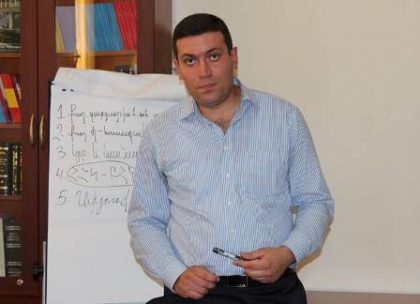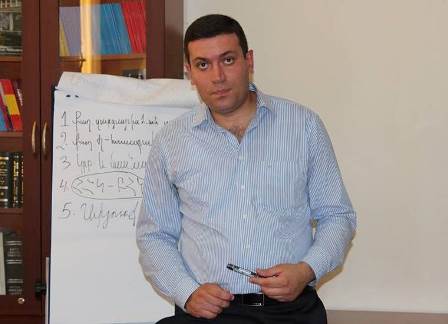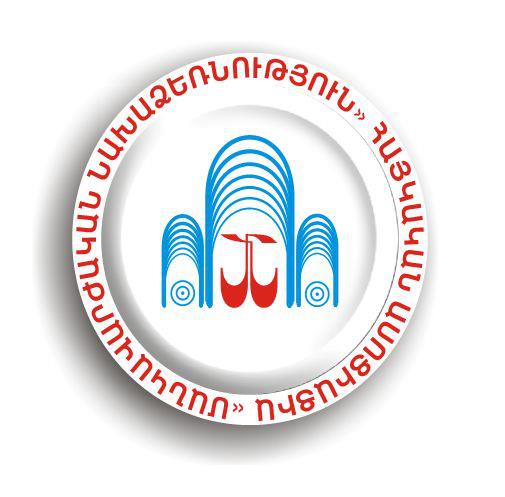
 The study is part of an overall interest in Diaspora educational establishments
The study is part of an overall interest in Diaspora educational establishments
Azad-Hye
On 12 December 2014, the “Pedagogical Initiative” Armenian Association's annual conference was held in Yerevan.
Participants received a copy of the book titled “Main Issues of Quality Education in Public Schools in Armenia” (2nd Volume, 248 pages).
Karo Jamharyan's article appeared in this publication covering the activities of the Vartanian School in Aleppo during the period 1937-1939.
Read the article here in PDF format.
On this occasion we had an interview with Karo Jamharyan.
Karo Jamharyan was born in Yerevan in 1986. Currently he is a scholar at the ?Devout Generation? Foundation?s Analytical Center in Yerevan. Author of seven scientific and dozens of other articles.
– What motivated you to study the history of the Armenian Vartanian school in Aleppo?
I am a researcher at the Armenian History Chair in the State Pedagogical University named after Khachatur Abovyan. My thesis is ?Educational & cultural life and Armenian identity preservation issues in Syria and Lebanon in 1920-1930s?. After researching the Syrian and Lebanese Armenian schools during the said period for more than four years, I have gathered, compiled and analyzed sufficient amount of information on the topic. The Vartanian School attracted my attention due to the significant position it occupied in the network of schools at that early stage in the Armenian community life in Aleppo. There was however lack of information. The documents provided by our compatriot Hrach Kalsahakian helped me to further explore the history of this school.
– What conclusions can we draw after researching the history of such schools?
The research related to Vartanian school and other schools that have operated before and after the specified period of time continues to have a contemporary value. It shows that the Armenians, after settling down in Syria, have always contributed in the political, economic and cultural life of the country. They have particularly cared for the educational needs of the new generations. This was an important task especially for a nation that has just come out of the Genocide and needed to maintain its identity. The study of the Vartanian and other schools in Aleppo demonstrates that Syrian Armenian community has evidently been the core of the Armenian Diaspora. It is important for the Ministry of Diaspora and concerned departments, to study and understand the community, in order to be able to take decisions related to its safety and revitalization process.
– Did you come into contact with Syrian Armenians living now in Armenia?
I have been always interested in Syrian Armenians. Those who have come to Armenia due to the circumstances have also been at the center of my attention. I try to communicate with them at every occasion, even when using public transportation. I highly appreciate their role here in Armenia and in the Diaspora.
– What are your academic plans now and in the future?
Besides the Syrian and Lebanese Armenian communities, I am currently involved in researching the Armenian culture in Diaspora in general. I am particularly interested in the Diaspora educational establishments, some of them have ? due to various reasons – ceased to function. I consider that the field of the Diaspora Armenian Studies has utmost importance, without which it would not be possible to imagine total Armenian Studies. In the future I would like very much to see my works published in volumes of significant scientific value.
TEXT IN ARMENIAN
 Հարցազրույց Կարո Ժամխարյանի հետ
Հարցազրույց Կարո Ժամխարյանի հետ
Ազատ-Հայ
Կարո Աղվանի Ժամխարյանը ծնվել է Երևանում 1986 թ. մայիսի 17-ին: Ներկայումս ?Բարեպաշտ սերունդ? հիմնադրամի գիտավերլուծական կենտրոնի փորձագետ է: Հեղինակ է յոթ գիտական և տասնյակ հրապարակախոսական հոդվածների:
– Ի՞նչ մեղեց ձեզ ուսումնասիրելու համար Հալէպի Վարդանեան վարժարանի պատմութիւնը:
Ես Խ. Աբովյանի անվան Հայաստանի պետական մանկավարժական համալսարանի հայոց պատմության ամբիոնի հայցորդ եմ, թեկնածուական ատենախոսությանս թեման է ?Կրթամշակութային կյանքը և հայապահպանության խնդիրները Սիրիայի և Լիբանանի հայ համայնքներում 1920-1930-ական թթ.-ին?: Շուրջ չորս տարի ուսումնասիրելով խնդրո առարկա ժամանակահատվածում հիմնված և գործունեություն ծավալած սիրիահայ ու լիբանանահայ վարժարանները` սույն թեմայի շրջանակներում բավականին տեղեկատվություն եմ հավաքել, համակարգել և վերլուծել: Հաշվի առնելով Հալեպի Վարդանյան վարժարանի հետ կապված տեղեկատվության սակավությունը, վարժարանի ծավալած գործունեության կարևորությունը և սիրիահայ վարժարանների ցանկում զբաղեցրած առաջնակարգ տեղը` սկզբնական շրջանից այդ կարևոր ուշադրության է արժանացել մեր կողմից: Վարժարանի գործունեության հետ կապված ուսումնասիրությունը առավել արժևորվեց հայրենակից Հրաչ Քալսահակյանի կողմից տրամադրված փաստաթղթերի վերծանումից հետո:
– Ի՞նչ կարելի է հետեւցնել նման դպրոցներու պատմութիւնը ուսումնասիրելով:
Վարդանյան վարժարանի` 1920-1930-ական թթ.-ի, դրանից առաջ և հետո գոյություն ունեցած վարժարանների գործունեության ուսումնասիրությունը առավել արդիական է 2011 թ.-ին սկիզբ առած սիրիական ճգնաժամի պայմաններում: Հայերը, դեռ վաղ ժամանակներից հաստատվելով պատմական Սիրիայի տարածքում, մշտապես կարևոր դերակատարություն են ունեցել Սիրիայի քաղաքական, տնտեսական, մշակութային կյանքում: Զարկ տալով ինչպես կրթամշակութային, այնպես էլ հասարակակական-քաղաքական կյանքի զարգացմանը` հայերը մշտապես կարևորել և առաջնային են համարել հատկապես մատաղ սերնդին կրթելու գործը: Այդ առաջնակարգ էր Մեծ Եղեռնից մազապուրծ աշխարհասփյուռ հայության պահպանության առաքելությունն իրագործելու տեսանկյունից: Միանշանակ, Վարդանյան վարժարանի և սիրիահայ մյուս վարժարանների պատմության ուսունասիրությունը ցույց է տալիս, որ սիրիահայ համայնքը, իրավամբ, հայ սփյուռքի կորիզն է: Պետք է ուսումնասիրել և հասկանալ սիրիահայ համայնքի պատմությունը, մշակույթը, որպեսզի ՀՀ սփյուռքի նախարարությունը և այդ խնդրով մտահոգ մյուս գերատեսչությունները կարողանան օբյեկիվ և հնարավորինս ճիշտ որոշումներ կայացնել սիրիահայերի անվտանգությունն ապահովելու և սիրիահայ համայնքի կենսագործունեությունը վերականգնելու համար:
– Ունեցա՞ծ էք Հայաստան հաստատուած Սուրիահայերու հետ մասնաւոր շփումներ:
Այո, ինձ միշտ հետաքրքրել և գրավել են սիրիահայերը և պատմական ճակատագրով ՀՀ-ում հաստատված սիրիահայությունը իմ ուշադրության կիզակետում է եղել: Նույնիսկ երթուղային տաքսիներում փորձել եմ ծանոթանալ, շփվել, կապ հաստատել սիրիահայերի հետ` կարևորելով նրանց դերը և Հայաստանում, և սփյուռքում:
– Ի՞նչ են ձեր ուսումնասիրական ներկայ եւ ապագայ ծրագիրները:
Ներկայումս ուսումնասիրում եմ ինչպես սիրիահայ և լիբանանահայ, այնպես էլ սփյուռքահայ մշակույթն ընդհանրապես: Ուշագրավ են հատկապես սփյուռքահայ կրթական հաստատությունները, որոնց մի մասը ներկայումս տարբեր պատճառներով չեն գործում: Առաջնակարգ եմ համարում սփյուռքագիտության զարգացումը, առանց որի դժվար է պատկերացնել ներկայիս հայագիտությունը: Ապագայում շատ կցանկանամ կատարված ուսումնասիրություններս ամփոփել գիտական նշանակություն ունեցող աշխատանքերում:
